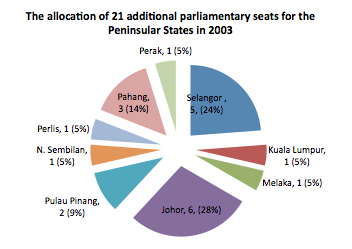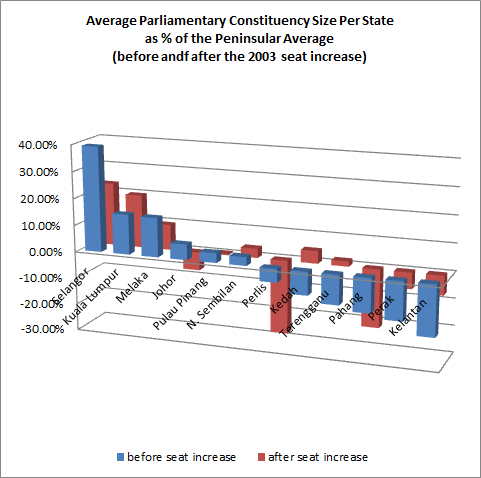(Part I appeared yesterday.)
A larger Parliament means a stronger Umno, even if BN wins with fewer votes.
Umno’s minority rule weapon 2: inter-state malapportionment and seat increase
What citizens cannot directly do anything about to stop Umno’s scheme of minority rule is the allocation and addition of parliamentary seats to the states.
Ideally, seats should be allocated and reallocated to the states so that each state/territory has equal representation as far as possible. In other words, the average electorate sizes of parliamentary constituencies across the different states should be roughly the same.
Correcting the inter-state malapportionment has been used by the EC as well as many BN and opposition politicians in support of the seat increase.
The argument is simple: states like Kedah, Kelantan and Terengganu, which were not given any additional seats in 2003 or states which are severely oversized, should be given more seats.
 Graph 2But was this the case for the additional 21 seats added to the peninsula? (See graph 2)
Graph 2But was this the case for the additional 21 seats added to the peninsula? (See graph 2)
Johor then got the lion share (six seats or 28%), followed by Selangor (5, 24%), Pulau Pinang (2, 9%) while Kuala Lumpur, Malacca, Negri Sembilan and Perlis were each given one more seat.
Did these states deserve their additional seats? Did those excluded states not deserve any increase?
Graph 3 shows the average parliamentary constituency size before and half the 2003 seat increase. Before seat increase, Selangor, Kuala Lumpur, Malacca, Johor, Penang, Negri Sembilan had constituencies larger than the peninsula average, while other states had smaller constituencies.
After the seat increase, the under-representation of Selangor, Kuala Lumpur, Malacca was reduced but was nevertheless significantly serious. Why were they not given more seats?
And why was Johor given six more seats (while the most under-represented Selangor was given only one seat fewer than Johor) that it would have smaller constituencies than the peninsula average after redelineation?
The third question to ask: why were Pahang (three seats!), Perak and Perlis given more seats when they were already over-represented?
 Graph 3, Putrajaya is excluded because due to its ‘state-like’ status and small electorate size, it must have one seat, no more no less.
Graph 3, Putrajaya is excluded because due to its ‘state-like’ status and small electorate size, it must have one seat, no more no less.
If the purpose of seat increase were to make the representation across the states fairer, then Selangor should have got 10 rather than five seats (totalling 27 rather than 22) while Kuala Lumpur and Malacca should have respectively three and two more instead of one.
Meanwhile, Johor should have only four extra seats instead of six (totalling 24 rather than 26), Kedah should have additional one more instead of none, Pahang and Perlis should retain their numbers at 11 and two, while Perak and Kelantan should have one seat fewer.
The EC only got it right with Penang (gaining two seats), Negri Sembilan (gaining one seat) and Terengganu (status quo).
The total size of our Parliament and the share given to each state and territory are stated in Article 46 of the Federal Constitution. Did our Parliament debate on why Pahang was given three more seats when it deserved none or why Selangor got only half of its rightful share?
It did not. When the amendment of Article 46 was tabled on June 16, 2003, it was purely academic, not because the opposition then did not have the one-third veto power to stop it.
It was academic because the EC started the redelineation on August 8, 2002 based on the number of 165 seats for the peninsula it had decided, when Article 46 then provided only 144 seats.
Then, the EC’s final proposal was passed by the Parliament on April 8, 2003, two months before the actual number in Article 46 was amended.
By creating a fiat accompli through the EC’s redelineation proposal, Umno/BN saved itself from public, inter-party and intra-party debates over which states and territories should get how many parliamentary seats.
This round, the Pakatan Rakyat has the veto power. We must tell them to use the power to force the BN to do things in the proper way.
If the BN government wants seat increase, it must appoint a parliamentary select committee to study the necessity of seat increase in the context of performance of parliamentarians and the fair allocation of seats across the states. For the very least, there must be a white paper.
The question here is not whether the EC’s intra-state delineation proposal will be fair. The question is that Parliament must consciously decide how many members it should have, on what ground and allocation by what criteria.
Parliament should simply not allow the EC to steal its power. Its sanctity must not be compromised for any electoral and partisan consideration.
No more back-door seat increase. Full stop.
Larger parliament, stronger umno
Redelineation and seat increase will largely decide if Umno-BN will get to form a minority government in term of vote share.
If it does, be prepared to see what we saw recently happening three times a year in parliamentary sessions, for possibly up to 10 years after the next redelineation.
In 2003, when 25 seats were added for the peninsula and Sabah, Umno was given 13 additional more seats to run in 2004. And in that election, BN won all but 20 out of 219 seats contested. A year later, Datuk Seri Hishammuddin Hussein started his keris-raising antic in the Umno Youth assembly.
If you are not prepared to do something, then get your popcorn and watch the next Umno drama. – December 4, 2014.
* This is the personal opinion of the writer or publication and does not necessarily represent the views of The Malaysian Insider.


Comments
Please refrain from nicknames or comments of a racist, sexist, personal, vulgar or derogatory nature, or you may risk being blocked from commenting in our website. We encourage commenters to use their real names as their username. As comments are moderated, they may not appear immediately or even on the same day you posted them. We also reserve the right to delete off-topic comments